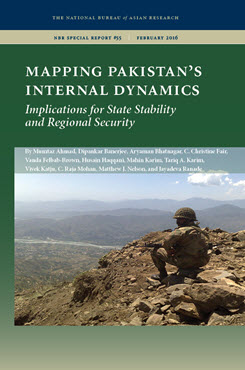Pakistan's Relations with Afghanistan and Implications for Regional Politics
This essay discusses the long-term and current relationship between Pakistan and Afghanistan, the intertwined militancy in the two countries, and the impact of India, the United States, China, and other regional powers on the Pakistan-Afghanistan relationship.
EXECUTIVE SUMMARY
MAIN ARGUMENT
Afghanistan’s peaceful future depends to a great extent on an auspicious regional environment, with Pakistan at its core. Conversely, an unstable Afghanistan threatens Pakistan, complicating the latter’s ability to refurbish its weak state and economy and suppress dangerous internal militancy. But in the absence of dramatically improved relations with India, Pakistan is likely to prefer an unstable Afghanistan to a strong Afghanistan closely aligned with India. Pakistan thus retains an interest in not liquidating its long-term relationship with the Afghan Taliban and the Haqqani network, a policy that exacerbates Afghan instability.
POLICY IMPLICATIONS
- Although the outreach to Pakistan by Afghan president Ashraf Ghani has warmed relations between the two countries, Pakistan’s geostrategic outlook and the limitations of its selective counterterrorism policies have not resolutely changed.
- Pakistan’s policies toward both militant groups and Afghanistan are determined as much by incompetence, inertia, and a lack of capacity as by calibrated duplicitous manipulation.
- Crucially, Pakistan’s willingness to accommodate Afghanistan-oriented militant groups is motivated by a fear of provoking militants to incite violence in Punjab and threaten the core of the Pakistani state instead of focusing externally. This paralyzing fear persists despite Pakistan’s desire to defeat the Tehrik-i-Taliban Pakistan.
- China’s increasing activity in Afghanistan might eventually motivate Beijing to put pressure on Pakistan in a way that it has previously been unwilling to do. Pakistan may thus face more united international pressure regarding its policies in Afghanistan and accommodation of militants than ever before.
- Nonetheless, an expectation of radical change in Pakistan’s strategic outlook and behavior toward militant groups will likely produce disappointment—in Afghanistan, India, and the United States. Yet all three countries would be wise not to sacrifice whatever limited collaboration with Pakistan is at times possible for the still-elusive hope of cajoling Pakistan into a full-scale and lasting counterterrorism partnership.
Vanda Felbab-Brown is a Senior Fellow at the Brookings Institution in Washington, D.C.


